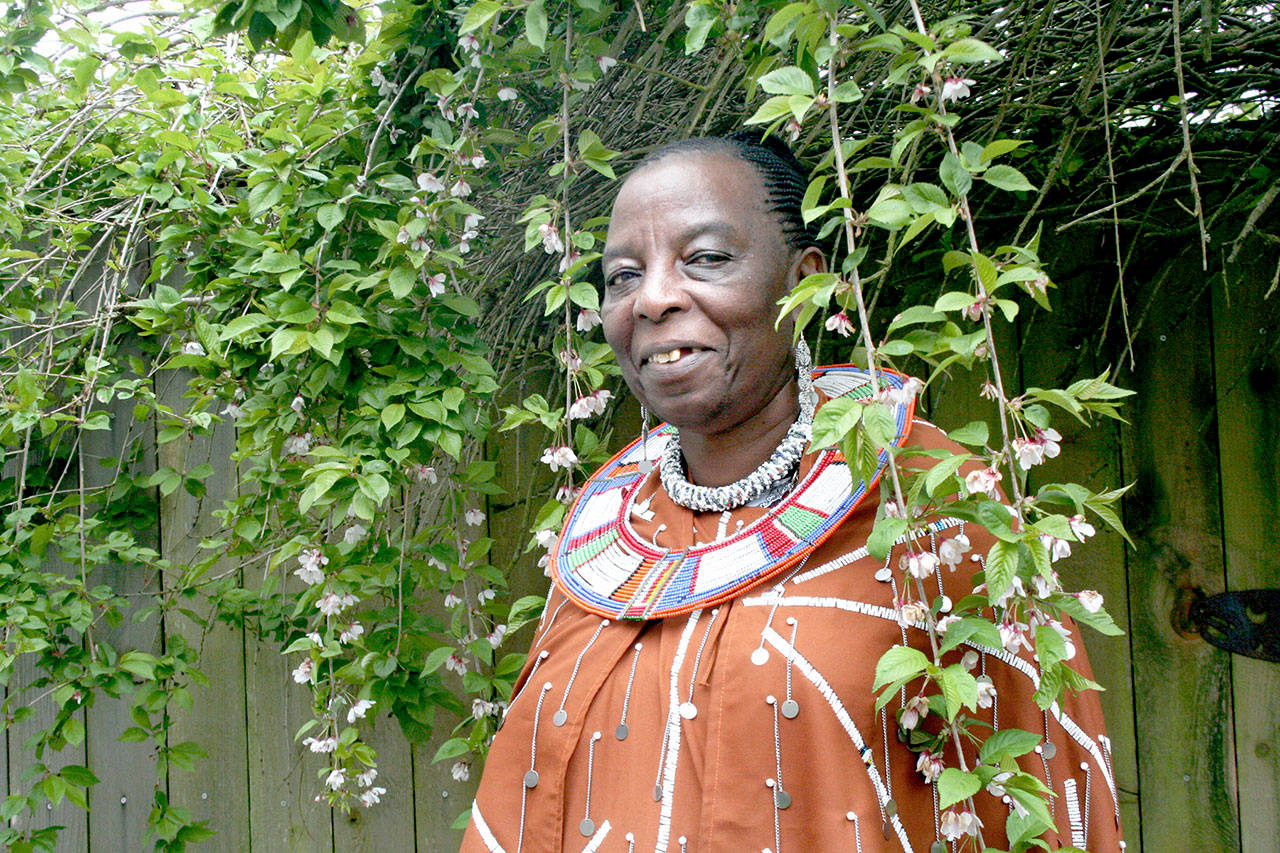CHIMACUM — Nakaji Lukumai stood in her Maasai shuka, a traditional dress that represents her people in northern Tanzania. The eldest of 56 children, she was the first woman in her tribe to go to school.
She carried on her father’s legacy of extolling the virtues of education by founding the first school for girls in the Maasai culture, and she worked for 12 years as a school inspector for the local government.
Lukumai, 63, is on her second visit to the United States and will be at the WE Feed Kids 5K on Saturday in Chimacum.
Proceeds will support healthy food for kids in Chimacum schools and Emburis Primary, which Lukumai founded in Monduli, Tanzania.
The charity run/walk will begin at 10 a.m. at the track at Chimacum High School, 91 West Valley Road.
Registration costs $35 per person, $10 for students and is free to any entrant with $35 or more in sponsorship. Participants must register by noon today at www.jccwp.org.
The event is jointly sponsored by the WE Act Club at the high school and the Community Wellness Project of Jefferson County.
It’s been a busy week for Lukumai, who addressed students in Chimacum schools at various functions.
The Maasai are a nomadic tribe often marginalized because of the way they keep animals such as cows, sheep, donkeys and goats, Lukumai said.
“They thought the land was free for everybody,” Lukumai said Tuesday while she was staying with a longtime friend in Port Townsend. “They went from place to place, looking for green grass for the animals.”
Her grandfather was a Maasai chief who sent her father to help the British fight a locust invasion before she was born. But her father had asthma — “a bad chest,” Lukumai said — and feared he would die while he worked in the fields.
Lukumai’s uncle had gone to school through fourth grade and learned how to read and write, she said. Then he taught her father, and those literacy skills saved his life.
“Because he knew how to read and write, he was given a job like a shopkeeper,” said Lukumai, who speaks three languages, including English. “He was asked to record everything — food, equipment — and he did it very well.”
It was a cultural shift, because Lukumai’s father promised to send all of his children, boys and girls, to school.
Lukumai just happened to be the first of his 56 children with seven different wives, she said.
“There were girls from other tribes who went to school, but not Maasai,” she said.
Lukumai initially didn’t like it. She watched other kids “playing, enjoying being young children,” but she understood what she was being asked to do.
“I was given the responsibility of obtaining an education,” she said.
In addition to her Maasai language, she learned Swahili in primary school. When she was old enough to attend secondary school — equivalent to high school in the states — she was required to study in English, because that’s the curriculum that was available, she said.
“My father told me, ‘I think it would be good if you become a teacher, so you can be a light to your sisters and brothers,’ ” Lukumai said.
She met Abby Jorgensen of Port Townsend in Tanzania when Jorgensen was looking for a place to teach English. Jorgensen, originally from Oregon, taught Lukumai’s son in the mid-1990s.
When Lukumai started a school for girls in Maasai, she ran into several initial challenges. She sent letters to families to tell them their daughters had been accepted into the program, but many were reluctant to allow them to attend, Lukumai said.
As Lukumai and Jorgensen made contact with families, they found the rough roads in the mountainous region difficult to navigate.
But they had some success. One girl walked for two days to get to the school, all the way through the bush where lions roam and up and over a mountain peak, Lukumai said.
“We were happy to say, within two years, everybody was bringing their girls to school,” Lukumai said.
One advantage was the boarding school environment. They had food to eat and a place to sleep, Lukumai said.
The school now has about 200 students in grades K-5, and she plans to expand up to grade seven.
________
Jefferson County Managing Editor Brian McLean can be reached at 360-385-2335, ext. 6, or at bmclean@peninsuladailynews.com.

